Money is an essential part of having the freedom and the choices to live life fully. John Christianson, an author and the Founder CEO of Highland Private Wealth Management, talks about money and our emotions when it comes to it. According to John, you can be super successful financially but be disabled or challenged emotionally which lead to decisions that aren’t in your best interest. John dives deep into the concept of money EQ and how assessing our emotional relationship with money can help us. He walks us through a path of financial literacy by connecting us to the meaning and purpose of what success looks like.
Big companies have lots of capital in some regions of the country. However, one of the problems in rural areas is having very little money and lack of access to capital to start a new business. Author, entrepreneur, and philanthropist Craig Hall talks about his recent book called Boom: Bridging the Opportunity Gap to Reignite Startups, revealing the challenges that most entrepreneurs encounter and the possible solutions to them.
I’m so glad you joined us because we have John Christianson and Craig Hall. John is the Founder and CEO of Highland Private Wealth Management. He’s the author of The Wealth Creator’s Playbook. Craig is an entrepreneur and New York Times bestselling author. His latest book is Boom. We’ve got a couple of great books to talk about.
Listen to the podcast here
Money EQ: Maximizing Your Return On Life And Money with John Christianson
I am here with John Christianson, who is the Founder and CEO of Highland Private Wealth Management, a boutique financial life management company in Bellevue, Washington. He has many years of financial experience. He helps executives at Amazon, Microsoft, Starbucks, Nike and Facebook. He’s also the author of The Wealth Creator’s Playbook: A Guide to Maximizing Your Return on Life and Money. It’s so nice to have you here. Welcome.
Thanks, Diane. It’s great to be here.
This is going to be fun. It’s always nice to have a fellow podcaster. You have The Wealth Confidant Podcast.
It’s such a great medium to meet wonderful people like you. Thank you for having me on your show.
You’re welcome. What you talk about is interesting to me. I’ve been the MBA Program Chair. I’ve taught so many classes in business. I have a background in real estate. Some of the stuff I talk about, some of it is new to me as well. What I was most interested in what you talk about is something called Money EQ. Since that’s what my dissertation was on, emotional intelligence, I love bringing emotions into the whole decisions about wealth and all that. I only tell you that so you know my background. It makes it more of a playing field. We can talk about what we both know in different areas. It plays off of one another. Tell me a little bit about your background of how you got interested in wealth creation and podcasting. Your whole background is interesting.

Money EQ: You can be successful financially but be disabled or challenged emotionally as it relates to money.
Back on the emotional intelligence and Money EQ stuff, I am looking forward to that. We’ll learn from each other. I came out of the accounting profession way back in the day. I’m a CPA by background and training. I got into the financial services industry in the ’80s. I became intrigued by this idea of the family office environment, which at the time, was before there was such a thing as wealth creation. This idea that that’s where wealth was managed and taken care of was in this thing called the family office. I took on the role of a CFO in a family office after a stint in the brokerage community. That’s where the light went off for me. I went, “I’d never seen anything like this before.” You had access to the entire playing field of someone’s life, all of their advisors, what was happening and going on. You weren’t in a position where you’re selling them anything. I’d been in the smiling and dialing era of getting clients in the ’80s with the brokerage community. That’s when I got lit on this idea of wealth management. I joined a firm out of Silicon Valley that was doing multi-client family office work, somewhat akin to what I was doing in the family office.
I started my own firm that is called Highland Private Wealth Management. The idea was to bring this multi-client family office concept to individuals and families. In the Seattle area, there’s been a lot of wealth creation. I happened to be in great timing and in a market and an environment where, at the time, Microsoft was spinning out millionaires on a pretty routine basis. I learned not only what that type of person needed and what they were interested in, but how they wanted to have an advisor work with them. The issues they were facing as wealth was coming at them faster than they had experienced before. I feel super fortunate that was something that I got to be able to do.
I laughed when you said smiling and dialing. In my mind, it was dialing for dollars. It’s the same thing. They used to throw the phone book at us and say, “Here’s your territory. Have a good time.” Decades of sales experience have been good for some things. Other times, you think, “That was a real learning experience. That was challenging.” Everybody wants to have wealth and be successful. Even if you’re not in sales, you want to be able to maximize. Even your subtitle A Guide to Maximizing Your Return on Life and Money. I was a pharmaceutical rep forever. Doctors were bad at this. They relied on people to handle their money for them. A lot of times, the office manager takes everything. They’d be out in the cold. It was sad to see. Do you see a lot of people struggle with this? If so, why?
What I experienced, it started in my own life. I found that I was at a place where I was checking the traditional boxes of success. Financial success was the definition for me because that’s what we were told. That’s what I was taught. For the people I work for, that was the equation. I did that. There was something incongruent for me. I felt like, “There’s got to be something else that leads to fulfillment.” I knew that was true. At the same time, I am working with these effective millionaires that we’re talking about. They’re somewhat coming to the same conclusion that it’s not bringing them a level of fulfillment and the joy they want to have in their life. If it’s not money that takes you there, what is it?
My story has been about going on a journey of, “If that’s not it, then what?” I concluded that it is a much more holistic definition of life. It’s not about giving the office manager, “Here’s your stuff. Go take care of it. I’ll never look at it again.” It’s, “The money is important. I need financial resources to have the freedom and the choices I want. What’s the other part of my holistic life that also leads me to what I call living fully?” That was the essence of it. The answer is yes. I don’t know if they all look like doctors and more of a hands-off thing. Everybody at some level wants more fulfillment, more joy and more contentment. They want financial success. It’s not either/or. I didn’t want it to be that way. I wanted it all. I didn’t want somebody to limit me and say, “You can only have that if you have a lesser version of that.” I was like, “I want it all.”
[bctt tweet=”Money doesn’t buy happiness.” via=”no”]A lot of people have an idea of what they want and what it takes to be happy. When they get a certain level of success or whatever, they still don’t feel fulfilled to some extent. Money doesn’t buy happiness. It makes certain things a little less bad though, at times. We all want to have the ability to be comfortable. In the Boomer generation, a lot of us thought that we would be able to retire. We wouldn’t have to worry about money. They made it sound like everything’s going to be there forever and you’re going to be great. There are a lot of people who have had a little bit of an emotional letdown from what things have happened. You talk about Money EQ, which I’m interested in. We suggested that about emotions connected to money. What do you write about in that respect? I’m curious how it ties into emotional intelligence if it does.
The essence of it is that you can have a high IQ. We all know people that are super smart. You’re on that list for sure of super high IQ. What we used to say back in the day was, “You can have a high IQ, but it doesn’t mean you have a high EQ, social intelligence.” I found that money was the same. You could be super successful financially but be disabled emotionally or challenged emotionally. It related to money. I was watching these clients that I was working with that we’re responding emotionally to money that wasn’t rational. It was leading them to conclusions and decisions that weren’t in their best interests. I created this idea called Money EQ. We have some level of emotional intelligence that we can be conscious of or unconscious of. It’s grounded in this idea that our emotions do lead to our decision making, to our behaviors. If I could step back and be clearer about what those emotions are, what those triggers are and reshape some of those things, could I make better decisions that are healthier for me? When it relates to money, it’s not only healthier for me but it’s healthier for the people around me? Money impacts our nuclear family and others. That’s the idea and essence. That’s what I was trying to accomplish.
I give emotional intelligence tests and different things as part of my training. I created a curiosity tool to measure how much curiosity holds you back. I’m always interested in different tools of how you assess behavior. What things do you ask in your assessments? What things have you found are impacting their emotional relationship with money?
I landed on this idea that there were two spectrums that I was experiencing with clients. The first one was the way they were holding money. It was determined based on this idea of stewardship versus ownership. Stewardship would say there is a priority base for the money, the idea that I have an open hand with the money. I sometimes call it the sandbox test. When we were kids, you got the sandbox and the toys. The idea was, “Are the toys ours for us all to share?” An ownership mindset would say, “Those toys are mine.” Owners have much more of a close-fisted response to that money. “It’s mine and for my benefit.”
The other spectrum that I was experiencing, seeing and trying to quantify was this idea of abundance versus scarcity mindset. The abundance mindset, much like the fuel gauge on your car, would say, “The gas is full.” It’s not so much based on the amount of money you have. It’s more of the mindset around your financial life. “Is there sufficiency? Is there plenty? Do I have enough?” In some cases, people have more than enough. It’s this idea that I have abundance in my life. The scarcity mindset is more in that position of, “There are a winner and a loser. I’ve got to get my share. There’s only so much to go around.” It’s like that game of musical chairs as kids. “I’ve got to make sure I get my part.”
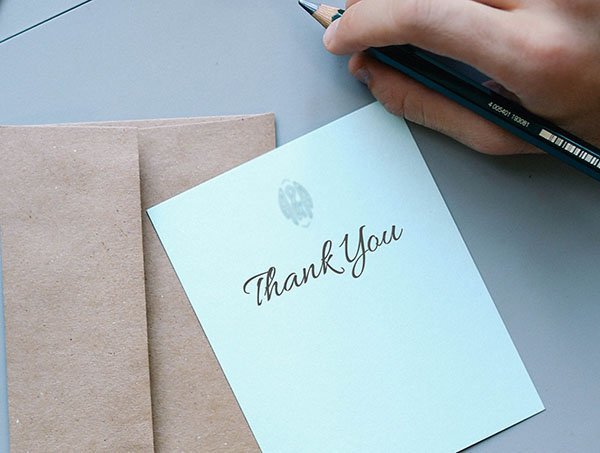
Money EQ: The practice of gratitude leads you to an abundance mindset.
That left me three fear-based quadrants. It’s four quadrants. Three of those were fear-based. The one that’s the most catabolic or probably the negative, life-draining energy would be the one where it says, “I’m an owner. I’ve got a close-fisted response to money.” I have a scarcity mindset that says, “I need more. I’ve got to have more.” Scarcity on that fuel gauge test didn’t say, “It’s empty.” It says, “I need more.” No matter how much I have, I need more. That leaves somebody in a position where they’re going to be concerned. They’re focusing so exclusively on the money to take away this anxiety and this worry. Those feelings of concern get you stuck. That’s why it’s the most catabolic space.
One of the other spaces is the idea that I’ve got a stewardship mindset. I have a more open-handed response to money. I have a scarcity belief system. That leads me to a place of confusion. The reason it’s confusing is that those things are somewhat in conflict with each other. You have to justify why I’m doing what I’m doing. You might have guilt. Even jealousy is in that space. The third space, which I talk about in my book, is this idea that I have an ownership mindset. It’s for me. I’ve got to close-fisted response to it. I have an abundance. What you have is somebody who is focused on self-sufficiency. You can be prideful sometimes about that self-sufficiency. It is all about me. I’ve got enough but it’s for my benefit. You can get in a hoarding mentality around the money. The last one is this idea of an abundance mindset. I’ve got my fuel tanks full. I have sufficiency and enoughness coupled with stewardship. That leads you to a place that’s healthier, which is one of contentment, joy and calm as it relates to your money. Generosity would flow out of that naturally. Those were the four quadrants.
I created an assessment tool, much like you’ve done, to give a place for people to go and take this test, the assessments. It positions you in one of those quadrants. I tell people all the time that it’s not to put you in a box. I don’t want to label anybody. What the questions do is it starts a dialogue. It starts to make money and your relationship to money conscious. A lot of times, we run around with our relationship to money being unconscious. Secondly, it tells you a little bit about the feelings that might be in that area and what you might do to improve that relationship. All of those things lead to this idea that I don’t think anybody’s in one of those spots all the time. We’re naturally wired to respond to money in a certain way. That’s a big part of the Money EQ.
The other part that plays into that I would want to mention is we all have a history with money. Our money history plays into our emotional reaction to that money. What role did money play in our life growing up? What did our parents teach us or not teach us about money? How have we taken those lessons, taking them into adult life and apply them in any number of ways? It’s like, “Never have debt,” or “Don’t ever talk to anybody about money. That’s private,” or whatever that is. We bring those in. We have reactions to money to play into the same emotional EQ. That’s a high level and a lot of stuff there.
A lot of it ties into the things I did when I studied mindset for curiosity, perception and some of the things that I research. We talk about some of the things that hold people back. In curiosity, it’s fear. Fear comes up in so many realms and so many different ways. I started to think that a lot of the relationship that I have with money is based on my family and what we’ve learned. You do have a lot of impact from growing up. In curiosity, your family plays a big role of whether you think something’s interesting or not because they’ve told you, “That’s stupid,” or “Don’t go that way,” or “Do this.” It’s amazing, the impact that our environment all has on us.
[bctt tweet=”We are wired to contribute and to bring value to the world.” via=”no”]I’ve got a lot of different experiences with money. My dad probably had a big impact on me. He was the guy who didn’t want to spend a lot of money. It came from old money. Back then, they didn’t spend a lot of it. They held onto it. That impacted probably my risk-taking things. When I sold loans to people when I was a loan officer, I saw the emotional attachment people had. It was so nice to sell B2B. When you go B2C, you get to see the emotions coming off in people. They don’t want to lose their money. It’s very emotion-based. You got a big challenge to change certain ways of people’s thinking. We get scared from hearing that the Social Security is going to be gone and the markets could crash again. How do you get over some of those fears?
Some of it is quantifiable. I say to people all the time, “Have you done the math? Instead of being in a state of anxiety, have you made the theoretical real? Have you done the data? Have you gotten a financial advisor? Have you done financial planning? Have you calculated how much is enough? What’s my number?” Do you remember the old commercial? It might’ve been a lending commercial. The people were walking around with little bubbles above their head. We all have one of those. Instead of chasing security, what if we did the math and calculated, “What are my solution sets? What are my options?” That’s doable and quantifiable. That’s one piece of it.
One thing comes to my mind. It’s having gratitude, being thankful for what we have. It’s interesting that the practice of gratitude leads you to one of the byproducts. It leads you to an abundance mindset. That’s one of the outcomes of that. The other thing that I tell a lot of people is this idea of experiences versus stuff. I did a lot of research with highly successful wealth creators. One of the questions in the research that came back loud and clear was, “We don’t want more stuff because that stuff comes with management, costs, oversight and worry. What we want are more experiences. We want more experiences with people we care about. What can you do regardless of the amount of money you have to connect your money to the people you care about, to doing things that will be lasting memories and experiences? We’ll do that for you.”
The last one would be this idea of generosity. It is, studies prove it’s true, a secret joy creator. It’s like free dopamine. It’s a fabulous thing, yet it doesn’t matter what your income level is. Our generosity levels have been pretty much stuck around 3% to 5%. Pick the study you want to look at of income. It doesn’t have to be a large amount of money. There is something to be said when we connect our money, our life, our time, resources and talents to things that are not about us. We contribute to contribute. That brings joy to our life. There are some tangible and practical things you can do to move in the direction of finding more contentment.
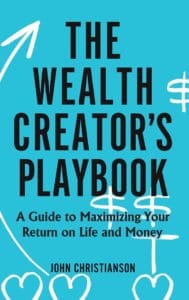
The Wealth Creator’s Playbook: A Guide to Maximizing Your Return on Life and Money
When you talked about stuff, George Carlin’s old routine came to mind. I don’t think he used the word stuff. We buy more stuff. We get a bigger house. You go to fill it up with more stuff.
That’s a financial, technical term.
It is very high tech. We do a lot of high tech on this show. I hope everybody can keep up. What came to mind is you’re talking about what people want with this stuff and all that. Millennials aren’t saving. They’re not preparing themselves that much for their future. We read a lot about that. We read about Generation Z is the most stressed generation. We’ve got all these things that are keeping people from focusing on their end goals. Are we focusing too much on what happens when we retire or not enough when we retire? Should we be doing more of that? What do you say for younger generations?
I wrote a piece, interestingly. It was about what would I say to my own kids that are the late twenties? I have one that’s 30. What I said to them was, “I don’t believe in retirement.” I don’t think we get to a place. That isn’t about retirement in the sense of, “I’ve got to get to 50, 60. I’m going to put on the shelf all of the wisdom and the things I’ve learned. I’m going to go out and play golf for the rest of my life.” There’s nothing against golf. I love golf. We were wired to contribute. We are wired to bring value to the world. We all have a unique contribution to bring. My hope is that, whether I’m getting paid for that or not as I get older. Sure I have less energy and all that. For a Millennial, it’s, “How do you connect yourself to something that brings meaning and purpose, moves your life forward in a way that’s joy-filled, and you feel it is bringing your unique contribution to the world?” That’s one part. Stop focusing on this arbitrary thing that I’m not sure what it’s grounded in.
The second thing is being clear about where you are going. I had a friend of mine that I row with. I’m a rower. I was rowing with the guy. He said, “My kids are not having a tough time budgeting. They’re Millennials having a tough time staying on top. They’re living paycheck to paycheck. How do I get them to skid out of that?” It’s like what you’re saying, which is, “How do I get them to take it seriously, start putting some money away and doing what we did and all that?” I said, “It’s not going to help as a parent to go in and go, ‘Let’s talk about budgeting.’ They’re going to shut down. What might help is to say, ‘Where are you going?’” I have this conversation with successful couples called Ideal Outcomes Conversation, which is this idea of defining success beyond a specific pile of money. What’s the money for? If you don’t know where you’re going, any road will get you there.
What does success look like? Define it. Write it down. What are those things that bring us energy and bring us passion and maybe has a little risk associated with it? Isn’t that where the best stuff in life happens? Some of those clues get Millennials thinking about that, which they almost do better than anybody. They can connect to meaning and purpose. They’re wired to do that. Once you get them connected to something, bring back the idea, “I’m on that path. I need to be financially literate. I need to be able to take care of myself.” It starts with this idea of where are you going and what does that ideal future look like? When you get up in the morning, I tell people, “Put that on the fridge. That’s where all the most important stuff lives in our house.” Why not put your greatest hopes and dreams on the fridge for the next few years?
I ask a question to people. It’s a simple one, which is, “If it’s a few years from now or several years from now, pick it.” We’re sitting here on this podcast. We’re talking about how phenomenal our lives are going. What’s going on to lead us to that conclusion? Specifically, who are we with? What are we doing? What’s going? What’s causing us to have this emotion that is phenomenal? Get people thinking as if that’s occurred. What is that? Write that stuff down. When you point your lives at those things, financial literacy has a way of taking care of itself in a lot of cases.
Your book is fascinating. I was looking forward to chatting with you about this. It’s The Wealth Creator’s Playbook: A Guide to Maximizing Your Return on Life and Money. John Christianson is the author of that. He also has a podcast, The Wealth Confidant Podcast. John, a lot of people probably want to know how they could reach you or buy the book. What’s the best way that they can find out more?
You can go to JCChristianson.com. My books are there. The Wealth Confidant Podcast episodes are there and newsletter. The Money EQ is there. That’s a free tool you can access. Any of the other resources are available to people that want to connect their life and their money to a life of meaning and purpose. They want to hold both of those. That’s the place to go. I appreciate anybody who wants to look at the book and look at what it says. All of the proceeds are going to charity. This is about getting out the message that people can live more maximized lives. They can have more than they’re having. Maybe they’re experiencing CD returns. They want to be experiencing stock returns in their life. I want to help, inspire and motivate people to get on that journey and take one step towards it. That’s the place to start.
[bctt tweet=”Money follows the success of an idea. ” via=”no”]Thank you so much for being my guest. This was a lot of fun.
It’s super fun. I would love to come back.
Reigniting Startups with Craig Hall
I am here with Craig Hall, who is an entrepreneur, civic leader and New York Times bestselling author and philanthropist. He formed HALL Group in 1968 in Ann Arbor, Michigan. The company controls billions of dollars in assets, is made up of several subsidiary brands, with interest ranging from real estate development, ownership and management to financial lending, HALL Wines and other winery operations. I’m interested in hearing about all that. It’s nice to have you on the show, Craig.
It’s great to be with you.
That’s quite a diverse background. I’m interested in hearing more about you. Where’s Ann Arbor? We had a summer place near Traverse City. I can’t remember where Ann Arbor is.
Traverse City is a beautiful area. Ann Arbor is about 45, 50 minutes from Detroit. It’s the inner part of the state. It’s where the University of Michigan is. It’s primarily a university town.
I’m interested in a little background on you. I gave a little bit here. Your latest book is Boom: Bridging the Opportunity Gap to Reignite Startups. I’m fascinated by discussing startups and entrepreneurship. What’s the background that makes you an expert in this area?

Money EQ: Technology makes it less expensive to start many businesses.
I was fortunate to have the opportunity to start a business when I was eighteen in Ann Arbor, Michigan. My businesses had their ups and downs. I’ve gone through lots of great experiences in a wide range of businesses. I found out a number of years ago that entrepreneurship, despite all the great things we hear, is going down in terms of the number of new startups in the United States. Starting in 2011, I started to research and work on the book that we’re talking about. I titled it Boom because I want to have a positive aspect of talking about a challenge that we have in the United States, which is the number of new businesses. It’s half as many as there were many years ago. It’s a serious challenge to start a new business for many people.
I’m curious why that is. I had a lot of people contact me to be on their board of advisors and different things for startups. Even boards of advisers are starting to get a lot more incentives to be on them. Everybody wants to go to IPO. Everybody wants to make sure they have the best advice going. Why do you think we’re having such a slowdown? Where are they going and why?
There are a number of factors. First of all, let me put some perspective on it. We’re very good at big startups. We’re good at the tech and biotech big idea companies. We’ve all heard of Facebook and those big companies do have lots of capital. It’s in certain areas of the country. Geographically, in Silicon Valley, New York or Boston, there’s lots of money. One of the problems is the rest of the country. There’s little money. There’s little access to money. If you’re in rural areas of America or Michigan, many states in many areas of the country lack access to capital to start a new business. What I’m concerned about is what I’d call traditional entrepreneurship. For instance, my wife’s family own two drug stores. 99% of the drug stores are owned by Rite Aid, Walgreens and CVS. Like so many industries, we see such consolidation that the smaller businesses for traditional businesses are being squeezed out. It’s a different environment. It’s when you don’t have the opportunities that I had. For everyone, it changes the fabric of American. It’s something we as a society should talk about and think about. There are things we can do to solve this.
I want to get into what we can do to solve it. The first one I ask you a little bit about is the mom and pop businesses and what opportunities exist. You think that there’s more connection to everything because of the internet. You could be out in the middle of nowhere and do something. In the past, you were more limited. Didn’t that help us? Is it not enough?
Technology is a double-edged sword, in the sense that it does have a lot of positives. It makes it less expensive to start many businesses. Clearly, technology has positives. In terms of rural areas, if you don’t have broadband, your connectivity can be significantly impacted. In general, technology also has a disadvantage for smaller startups. It enables companies to grow so big. It enables more of a select few to dominate a business or an area. When I look back at my own career, a lot of the industries that I’ve been involved in have consolidated dramatically and made it much more difficult for newcomers. That is a phenomenon that naturally occurred, in part because of technology and in part because of globalization. We haven’t talked about it as a society. We haven’t had a conversation about, “Should we do things to encourage and enable more people to have more opportunity?” That’s what my book is all about. That’s why I say, “Bridging the opportunity gap.” We’ve created an opportunity gap. In my case, I was a lower-middle-class American. I started my business with no family money and no experience from anyone. My family was an entrepreneur. At the time, I never thought I couldn’t do it. I never thought, “Why not? I’m an American. I have a right to start a business.” Nowadays, it’s more difficult.
[bctt tweet=”Great success has ups and downs, and that’s what enriches life.” via=”no”]It can be challenging. Maybe they can’t compete with Uber and Amazon or whatever. Create something that they might be able to buy out. Is that what the focus is that we see? Are you talking more for people who want to have a company and not even think about selling it later? They just want to do something like a small mom and pop thing.
All of the above are good. Whether it’s a mom and pop business, it’s fine. It’s great and it serves the community. It serves a need. A lot of businesses start small but grow big. That’s great too. I don’t personally encourage people to start a business with the idea, “Here’s a niche that I can sell out in a short time and get rich.” There is that phenomenon that some people would say, “I got this idea. I want to start it and in a few years, sell it.” I prefer to think about something that a person is passionate about doing first and foremost. The money follows the success of the idea. Hopefully, it’s a long-term vision. Sometimes things happen that’d change that. If you get a huge offer, I wouldn’t say, “Don’t take advantage of it.” It’s most important that you have a passion for whatever it is you’re doing.
I’m all interested in passion. Developing curiosity is part of what I do. If you look at the levels of curiosity in different things around the world, we see a lot more levels of stress in Gen Z. Different generations are not as curious as others. I saw that you had found that people starting companies under 30 were starting to fall quite a bit. Let’s start with Millennials and Gen Z, the younger generations. Are you seeing that they’re interested in starting new ventures? Where do they fall?
They’re very interested, but the facts are they’re not starting businesses because of a number of reasons. One reason is in the days, for instance, of Baby Boomers, they owned homes. Many people in their 20s or 30s owned a home. When they had a business idea, they could get a second mortgage and use that money to start their business. A lot of the Millennials don’t own homes. On top of that, the second problem they have is a lot of them have student debt. If you are starting out with an acre of debt and no nest egg of a home. You had the fact that a number of people simply were frightened away by the Great Recession, what they saw in 2008 and 2009. It washed away a lot of people’s businesses and a lot of people’s homes and aspirations. Many people prefer to take a safer route nowadays. The numbers are scary. According to the Federal Reserve Banks’ research, people under the age of 30, there are 65% fewer owners of businesses than there were in the 1980s. That’s a big difference.
I’m sure they’re impacted a lot by the big-box stores. Do you have solutions for some of this? What can we do about this?

Money EQ: Part of the American dream is to have the freedom to start a business and own your own home.
Start with the fact that access to capital is a huge piece. In that area, we use our tax laws to provide incentives for all things. People invest in commercial real estate because there are advantages that are provided under the tax code. People invest in oil and gas for similar reasons. We could easily take traditional startups, provide tax incentives to individuals who are high-income earners and accredited investors and set up a method that would encourage them to invest in businesses that don’t otherwise get funded. The big companies that are high tech ideas in Silicon Valley, they don’t need incentives. These incentives should be greater for women, greater for people of color and greater for rural areas. Those three categories are dramatically worse. Everyone’s got a problem. They’ve got a bigger problem. That would be the one starting point. The issues we’re talking about with Millennials, we should develop a program that suspends student debt payments and relieves student debt payments as people prove themselves out to be working as an entrepreneur and starting a business. We need to relieve some of that student debt. That’s something that can be done. All of these things can be productive for the United States economy because new small businesses create jobs. Jobs create tax benefit to the country and at large. It’s not a free ride. It’s a good investment for our tax dollars.
It’s going to be interesting to see what they do about the student loan thing. When billionaire Robert Smith paid off all the Morehouse class loans, where he says he’s going to do that, it was such an impact. These people are starting with a clean slate. Younger generations have so much on their plate. That’s an important thing to bring up. I have to admit that I see a lot of students who want to get loans, thinking that they could get a little bit extra money. Maybe they don’t buy books. They have a little extra money for this or that. They get strapped out. I don’t even know if they realize that these things don’t go away. It’s death, taxes and student loans.
You mentioned books. Books are so expensive these days that people are buying in these colleges. I sympathize with these young folks.
It’s tough. When I was an MBA Program Chair at Forbes School of Business, I did a lot of research into ways we can have online resources so you don’t have to spend as much on this and that. I’m a big advocate of education, but I’m not a huge fan of student loans. There are other things that we can do to make it cheaper. There are things you can do to work alongside, to try and pay for things. I don’t like the direction some of that is taking. It’s too bad it has to be that way. Education is ripe for reinvention. It’s going to be interesting to see what they do. I do teach a lot of entrepreneurship-based courses. I don’t know if you know Marty Zwilling. He writes a lot for Forbes. He’s a friend. He’s been on the show. He’s a big entrepreneur guy. I had him do some little extra videos I used to put in my courses. There’s so much that students can use to learn to become better entrepreneurial thinkers. How do you know if you’re meant to be an entrepreneur at that age? Do you think it’s a burning desire you have right off the bat or is this something we grow into?
It’s both. Some people are genetically or naturally prone toward entrepreneurship. There are cultures and societies that are more entrepreneurial than others. At the same time, there are people that can be taught or learn to be an entrepreneur at an older age or for different reasons. Being an entrepreneur is heavily about risk-taking. Some of that’s natural. Some of that’s in your environment and learned. Like what you’re doing, it’s very helpful. There are a lot of good things going on to encourage entrepreneurs. It’s through nonprofits, through education and even through local governments. Despite all that, the numbers show that it’s not as strong of a startup world as it was a handful of years ago. It’s been a steady decline. That’s what’s scary. There’s a lot of positive energy that wants to see this change but it’s not happening. That’s why we need a national policy. We need a broader base set of policy to make a change.
[bctt tweet=”Connect yourself to something that brings meaning and purpose and moves your life forward. ” via=”no”]What are the ramifications other than not as many businesses? We have all the big guys and companies, the Amazons of the world taking over. Are you worried about monopolies? What’s the downside to this?
It’s a bit of all of the above and more. I do think that when we have a consolidation of industries and we have more or fewer monopolies, that’s not great for the consumer. That’s one negative to not having more startups, more entrepreneurship, and a more diversified set of business producers. That’s almost secondary to the fact that most of the net new jobs in our country are provided by smaller businesses. Having startups and smaller businesses is a job creator. It’s the creator of a tax benefit to the country. We need growth. The fact is our growth is slowing down. One of the ways that we can speed up our growth as a country is by having a revitalization of new and small businesses.
The final point, which is very important, is that it’s part of the American experience. It’s part of the American dream to have the freedom as a middle-class American to start a business and own your own home. Those things are what at least I brought up. When my parents came back from World War II, that’s what they fought for. That was a part of what I grew up as believing Americans had a right to do. We put so many roadblocks and obstacles in the way of people, whether it’s too much regulation, whether it’s lack of access to capital or student debt. All these problems make people have stress and make people not realize their dreams. We need to create more opportunity.
You’re reminding me of a Forbes Summit I went to years ago in the Midwest. It was in Chicago. Forbes and a lot of people were talking about a lot of this. Where you are was the Silicon Valley of the day. That’s where everything happened. Everything happens in Silicon Valley. It will be interesting to see the next big thing, what it is, where it is and how it works. I find the whole idea of what we can do to grow into the next era interesting. We talk about being stressed out. We talked about different generations. Gen Z is the most stressed generation. They’re the next one that’s going to decide where we go in some ways. It’s funny to hear the Millennials starting to talk about these young kids. Every generation looks at the next one. That’s what we do. They all have great insights from every generation.
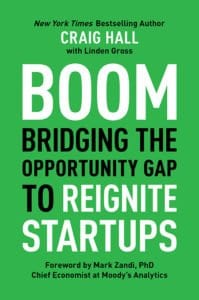
Boom: Bridging the Opportunity Gap to Reignite Startups
That’s what I was trying to do with my curiosity research. I’m trying to get people to be more curious about things that they’ve put on the back burner. We get pushed away from ideas and experiences from our environment. There are a lot of great TED Talks about how young people were super creative. It was 98% when they’re five. When they get to be an adult, it’s down to 2% or something. It’s a huge change of what we’re educating people of the experiences they’re having and of changing the way they think. What’s the biggest thing that they can take away from Boom to help them analyze what their potentials are and how to move forward?
First of all, I start the book by saying that while the book is about the challenges and the solutions for entrepreneurs. I sure wouldn’t want anyone to read it with the idea that all these challenges are going to be too hard and, “I’m not going to try to be an entrepreneur.” I encourage everyone, despite the fact that the environment could and should be better than it is. Go for it. If you’ve got an idea and you’ve got a passion, go for it. I don’t suggest that it’s all good or bad. There are a lot of good things that will support entrepreneurs that weren’t there many years ago. At the same time, we should improve the environment. We should talk about what world we want. Maybe the next generation is going to be part of the solution to what has been slowly happening. What’s been happening is there’s been a greater gap between the rich and the lack of opportunity for others. It’s a have and have-not world. Even though I’ve benefited in some ways from that world, I would rather have less and share more by having more opportunity for others. That’s the world that I hope we’re going to create going forward.
You’ve done very well. I was looking at some of the awards you’ve won and honors. The Horatio Alger Association of Distinguished Americans, Ernst & Young Entrepreneur of the Year, those are some big awards. I talk to people about entrepreneurship. Risk-taking seems to be a huge factor. I’m not a huge risk-taker. When you’re talking getting VC funding, it’s other people’s money. When these people are bootstrapping and other things, how do you get to be more of a risk taker?
First of all, the whole area that you’re the expert in and studying so much, its curiosity is the beginning. Some of it is a natural instinct. I enjoy risk. Sometimes you’ll land on your face and you’ll lose. I’ve had some long, difficult periods in my career to that great success. It’s moment by moment. It’s ups and downs. That’s what enriches life. We only have one shot at all of this, as best we know. I like to make the most of it. I don’t think that risk is for everyone. I don’t think everyone should be an entrepreneur. Everyone who wants to be should have more of an opportunity to be an entrepreneur. That’s the bottom line to create a level playing field that got lots of opportunity for all Americans, not just a handful or a few.
It’s interesting you brought it up in that way. I’m a huge risk-taker when it comes to new ideas and trying things. When it comes to losing money, it’s a little bit harder for some people.
It is and it varies. It gets harder too as you get older. In that sense, I was lucky because I started my main business when I was eighteen. When people are in their 20s or 30s, it’s a great time to start a business. Yet, it’s more difficult nowadays for the reasons we’ve talked about.
You did a great a review of all the issues that they’re facing. I take a lot of these clips and I use them in my courses. Students need to open up their mind to some different ways of thinking and some different opportunities that exist. You say the American dream is alive and well still. We have to think that we can achieve it. A lot of people could learn a lot from Boom: Bridging the Opportunity Gap to Reignite Startups. It’s a fascinating look. You had a foreword by Dr. Mark Zandi in it. You’ve touched on some of the topics that everybody could benefit from, whether it’s a small business or a large business. If somebody wanted to find out more about your book or talk to you about what you’re doing, is there some link you’d like to share?
We have a website called ReigniteStartups.com. We are doing some work in nonprofits and other areas to try to help particularly women and people of color. We are always looking for new ideas to help people start businesses. That’s a passion that I have. Sharing some of the great opportunities I’ve had is a pleasure and a joy.
I am so glad you were able to share that on the show, Craig. This was so interesting. Thank you for being my guest.
Thank you so much. You do a great show. I appreciate being a part of this.
I’d like to thank John and Craig for being my guests. We get so many great guests on the show. If you’ve missed any past episodes, you can go to DrDianeHamiltonRadio.com. You can contact me through that site. If you’re interested in any information about Cracking the Curiosity Code or giving the Curiosity Code Index, that’s all at CuriosityCode.com. I hope you enjoyed the episode. I hope you join us for the next episode of Take The Lead Radio.
Important Links:
- Highland Private Wealth Management
- The Wealth Creator’s Playbook: A Guide to Maximizing Your Return on Life and Money
- The Wealth Confidant Podcast
- Money EQ
- JCChristianson.com
- HALL Group
- Boom: Bridging the Opportunity Gap to Reignite Startups
- Marty Zwilling – past episode
- ReigniteStartups.com
- CuriosityCode.com
About John Christianson

About Craig Hall


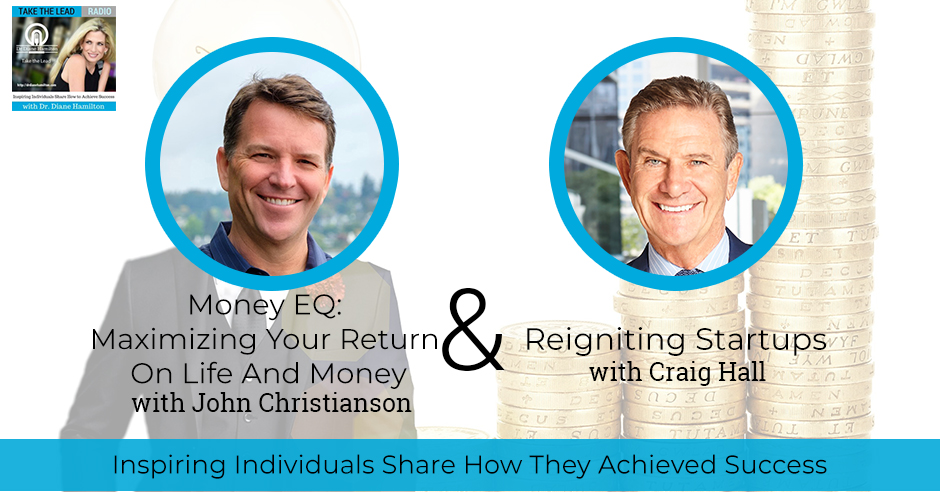
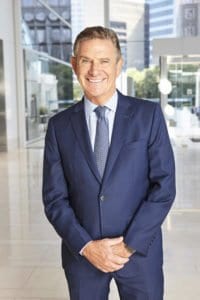

0 Comments